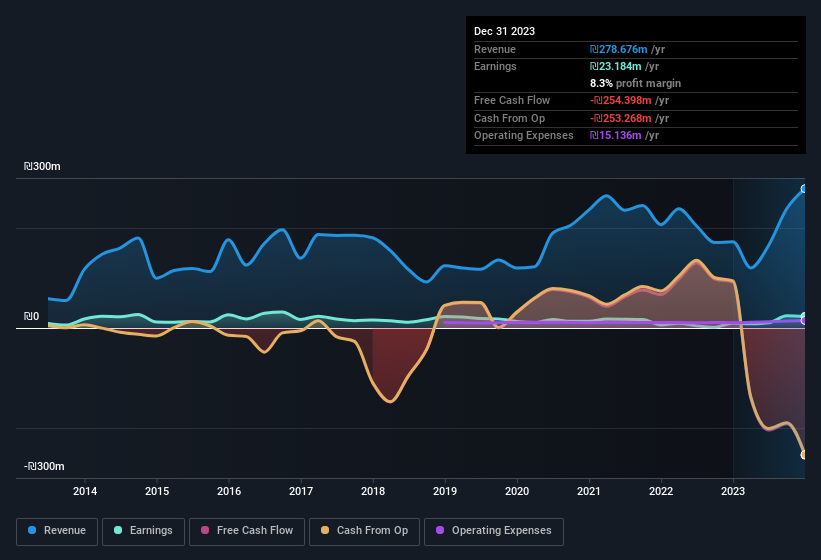- Israel
- /
- Real Estate
- /
- TASE:AVIV
Mordechai Aviv Taasiot Beniyah (1973)'s (TLV:AVIV) Promising Earnings May Rest On Soft Foundations
Despite posting some strong earnings, the market for Mordechai Aviv Taasiot Beniyah (1973) Ltd.'s (TLV:AVIV) stock hasn't moved much. Our analysis suggests that this might be because shareholders have noticed some concerning underlying factors.
Check out our latest analysis for Mordechai Aviv Taasiot Beniyah (1973)

Examining Cashflow Against Mordechai Aviv Taasiot Beniyah (1973)'s Earnings
Many investors haven't heard of the accrual ratio from cashflow, but it is actually a useful measure of how well a company's profit is backed up by free cash flow (FCF) during a given period. The accrual ratio subtracts the FCF from the profit for a given period, and divides the result by the average operating assets of the company over that time. You could think of the accrual ratio from cashflow as the 'non-FCF profit ratio'.
Therefore, it's actually considered a good thing when a company has a negative accrual ratio, but a bad thing if its accrual ratio is positive. While having an accrual ratio above zero is of little concern, we do think it's worth noting when a company has a relatively high accrual ratio. Notably, there is some academic evidence that suggests that a high accrual ratio is a bad sign for near-term profits, generally speaking.
Over the twelve months to December 2023, Mordechai Aviv Taasiot Beniyah (1973) recorded an accrual ratio of 0.43. As a general rule, that bodes poorly for future profitability. And indeed, during the period the company didn't produce any free cash flow whatsoever. In the last twelve months it actually had negative free cash flow, with an outflow of ₪254m despite its profit of ₪23.2m, mentioned above. It's worth noting that Mordechai Aviv Taasiot Beniyah (1973) generated positive FCF of ₪92m a year ago, so at least they've done it in the past. One positive for Mordechai Aviv Taasiot Beniyah (1973) shareholders is that it's accrual ratio was significantly better last year, providing reason to believe that it may return to stronger cash conversion in the future. Shareholders should look for improved cashflow relative to profit in the current year, if that is indeed the case.
Note: we always recommend investors check balance sheet strength. Click here to be taken to our balance sheet analysis of Mordechai Aviv Taasiot Beniyah (1973).
Our Take On Mordechai Aviv Taasiot Beniyah (1973)'s Profit Performance
As we discussed above, we think Mordechai Aviv Taasiot Beniyah (1973)'s earnings were not supported by free cash flow, which might concern some investors. As a result, we think it may well be the case that Mordechai Aviv Taasiot Beniyah (1973)'s underlying earnings power is lower than its statutory profit. But the happy news is that, while acknowledging we have to look beyond the statutory numbers, those numbers are still improving, with EPS growing at a very high rate over the last year. At the end of the day, it's essential to consider more than just the factors above, if you want to understand the company properly. Keep in mind, when it comes to analysing a stock it's worth noting the risks involved. For example, we've found that Mordechai Aviv Taasiot Beniyah (1973) has 4 warning signs (3 can't be ignored!) that deserve your attention before going any further with your analysis.
Today we've zoomed in on a single data point to better understand the nature of Mordechai Aviv Taasiot Beniyah (1973)'s profit. But there are plenty of other ways to inform your opinion of a company. Some people consider a high return on equity to be a good sign of a quality business. So you may wish to see this free collection of companies boasting high return on equity, or this list of stocks that insiders are buying.
The New Payments ETF Is Live on NASDAQ:
Money is moving to real-time rails, and a newly listed ETF now gives investors direct exposure. Fast settlement. Institutional custody. Simple access.
Explore how this launch could reshape portfolios
Sponsored ContentNew: Manage All Your Stock Portfolios in One Place
We've created the ultimate portfolio companion for stock investors, and it's free.
• Connect an unlimited number of Portfolios and see your total in one currency
• Be alerted to new Warning Signs or Risks via email or mobile
• Track the Fair Value of your stocks
Have feedback on this article? Concerned about the content? Get in touch with us directly. Alternatively, email editorial-team (at) simplywallst.com.
This article by Simply Wall St is general in nature. We provide commentary based on historical data and analyst forecasts only using an unbiased methodology and our articles are not intended to be financial advice. It does not constitute a recommendation to buy or sell any stock, and does not take account of your objectives, or your financial situation. We aim to bring you long-term focused analysis driven by fundamental data. Note that our analysis may not factor in the latest price-sensitive company announcements or qualitative material. Simply Wall St has no position in any stocks mentioned.
About TASE:AVIV
Mordechai Aviv Taasiot Beniyah (1973)
Mordechai Aviv Taasiot Beniyah (1973) Ltd.
Slight risk and fair value.
Market Insights
Weekly Picks

THE KINGDOM OF BROWN GOODS: WHY MGPI IS BEING CRUSHED BY INVENTORY & PRIMED FOR RESURRECTION


Why Vertical Aerospace (NYSE: EVTL) is Worth Possibly Over 13x its Current Price


The Quiet Giant That Became AI’s Power Grid
Recently Updated Narratives


MINISO's fair value is projected at 26.69 with an anticipated PE ratio shift of 20x


Fiverr International will transform the freelance industry with AI-powered growth

Jackson Financial Stock: When Insurance Math Meets a Shifting Claims Landscape
Popular Narratives


MicroVision will explode future revenue by 380.37% with a vision towards success


Crazy Undervalued 42 Baggers Silver Play (Active & Running Mine)


NVDA: Expanding AI Demand Will Drive Major Data Center Investments Through 2026
Trending Discussion


